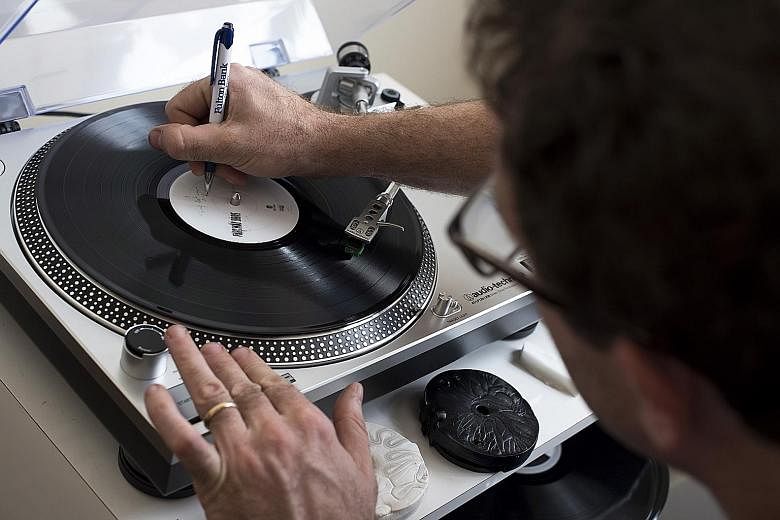BORDENTOWN, NEW JERSEY • The machines at Independent Record Pressing whirred and hissed as they stamped out a test record. The business' owners waited anxiously for Mr Dave Miller, the plant manager, to inspect the still-warm slab of vinyl.
"That's flat, baby!" he said as he held the record, to roars of approval and relief. "That's the way they should come off, just like that."
Independent Record Pressing is an attempt to solve one of the riddles of today's music industry: how to capitalise on the popularity of vinyl records when the machines that make them are decades old and often require delicate and expensive maintenance. The six presses at this new 20,000 sq ft plant, for example, date to the 1970s.
Vinyl, which faded with the arrival of compact discs in the 1980s, is having an unexpected renaissance. Last year, more than 13 million LPs were sold in the United States, according to the Recording Industry Association of America, the highest count in 25 years, making it one of the record business' few growth areas.
But the few dozen plants around the world that press the records have strained to keep up with the exploding demand, resulting in long delays and other production problems, executives and industry observers say. It is now common for plants to take up to six months to turn around a vinyl order - an eternity in an age when listeners are used to getting music online instantly.
"The good news is that everyone wants vinyl," Mr Dave Hansen, one of Independent's owners and the general manager of the alternative label Epitaph, said on a recent hot afternoon as the plant geared up for production.
"The bad news is everything you see here today," he added, noting that the machines had to be shut down that afternoon because of the rising temperature of water used as a coolant. To replace an obsolete screw in one machine, Independent spent US$5,000 (S$7,000) to manufacture and install a new one.
The vinyl boom has come as streaming has taken off as a listening format and both CDs and downloads have declined. The reasons cited are usually a fuller, warmer sound from vinyl's analogue grooves and the tactile power of a well-made record at a time when music has become ephemeral.
Most surprising is the youth of the market: According to MusicWatch, a consumer research group, about 54 per cent of vinyl customers are 35 or younger.
Mr Hansen and Mr Darius Van Arman, a founder of Secretly Group, a consortium of small record companies that is a partner in Independent, said they believed their customers were often discovering new music through streaming and then collecting it on LPs.
"None of this was supposed to happen and yet it's happened," said Mr Michael Fremer, a senior contributing editor at Stereophile magazine and a long-time champion of vinyl as a superior medium for sound.
Independent's machines tell some of the history of the modern music business. Mr Miller, 62, helped build them as a young man in the 1970s and they were used for decades at the Hub-Servall plant in Cranbury, New Jersey; Mr Miller recalled pressing copies of the Saturday Night Fever and Grease soundtracks there.
In 2007, Hub-Servall's presses were sold to RIP-V, a new plant in Montreal that took on Epitaph as a client. RIP-V shut down last year and Independent bought six of its 14 machines and brought them back to New Jersey. (The rest went to other plants.) Mr Hansen said he and Secretly had invested US$1.5 million in the venture.
For the music business overall, vinyl is still a niche product, if an increasingly substantial one.
According to Nielsen, LPs now represent about 9 per cent of sales in physical formats. But for indies such as Epitaph and Secretly, vinyl has become essential: Both now take in nearly as much revenue from LPs as they do from CDs.
There is now a global rush to set up more plants and find existing presses, but the few that have been tracked down are often in poor shape. This year, Mr Chad Kassem of Quality Record Pressings in Salina, Kansas, found 13 disused machines in Chicago - "they looked like scrap metal to anybody but me," he said - and he hopes to restore five of them within six months.
NEW YORK TIMES

